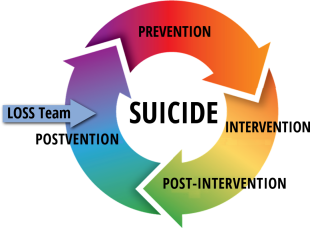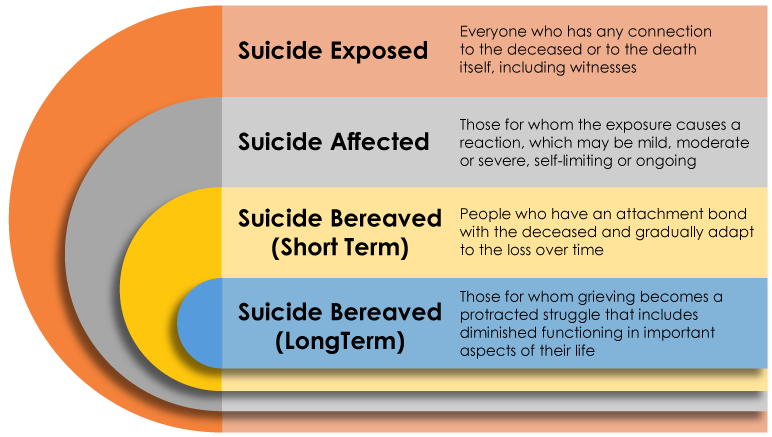LOSS Team
Local Outreach to Suicide Survivors

“Circular Model of Suicide Reduction” by Dr. Frank Campbell
What is the LOSS Team?
LOSS, Local Outreach to Suicide Survivors, is a suicide postvention model involving teams of two or more trained volunteers who proactively offer support to those impacted by suicide loss. Each LOSS Team includes at least one survivor of suicide loss, and teams offer support, resources, and understanding to newly bereaved survivors in an impactful but non-intrusive manner.
Having a person who has also lost someone to suicide present in the immediate aftermath can offer a connection to hope. Through shared understanding and experience, LOSS Team volunteers can be a calming and reassuring presence. Survivors of suicide loss can provide hope by sharing their experience and introducing themselves as someone who has also been impacted by suicide.
What does a LOSS Team Do?
Every loss is unique, and so is the support we provide. LOSS Teams offer compassionate care tailored to the needs of individuals and families, supporting them through their grief journey with understanding and resources.
Collaboration
Works alongside law enforcement, chaplains, coroners, and other community partners to support survivors immediately or soon after their loss.
Peer Support
Offers guidance to loss survivors through a peer model, connecting them with volunteers who are also suicide loss survivors.
Resource Guide
Maintains a directory of mental health providers experienced in supporting those who have experienced loss.
Community Education
Provides education to businesses, agencies, faith communities, and others on suicide prevention and postvention strategies.
Postvention
Provides compassionate and timely support to individuals and communities after a suicide loss, fostering healing and reducing risk.
Support Group
Hosts a Survivor of Suicide Loss Support Group to provide ongoing connection and healing.
For more information about the support group, click here.

Connect with the loss team
If you or someone you know could benefit from the support of the LOSS Team, reach out to us. We’re here to provide understanding, resources, and hope during a difficult time.
Phone: (865) 545-9199
Email: lossteam@contactlistens.org
What is Postvention?
Postvention refers to the counseling and support services provided after a traumatic event, particularly following a suicide loss. This intervention aims to help those affected by the tragedy cope with the emotional impact, reduce the risk of further harm, and support their healing journey. The term was first coined by Dr. Edwin Shneidman in 1972, who emphasized that the greatest public health challenge lies not only in preventing suicide but also in alleviating the stress and trauma experienced by survivors. Postvention focuses on helping those left behind navigate their grief and restore their well-being, offering them the resources and care necessary to move forward.
What is a Survivor of Suicide Loss?
A suicide loss survivor is anyone impacted by a death by suicide. This includes family members, friends, coworkers, peers, neighbors, and anyone else who feels the emotional and psychological effects of losing someone to suicide.

The Impact of Suicide Exposure
A 2018 study by Cerel and colleagues at the University of Kentucky revealed that for each suicide, 135 people are exposed to the loss, amounting to 6.2 million people in the U.S. being impacted by suicide in a given year. This exposure underscores the vast number of individuals who may be in need of both suicide prevention and post-suicide support (postvention).
As the study highlights, understanding the true scale of those affected by suicide is critical. These findings demonstrate the need for expanding services and resources to support the bereaved, helping to mitigate the long-term effects of suicide. Suicide postvention is now recognized as a vital public health priority.
Cerel J, Brown MM, Maple M, Singleton M, van de Venne J, Moore M, Flaherty C. How Many People Are Exposed to Suicide? Not Six. Suicide Life Threat Behav. 2019 Apr;49(2):529-534. doi: 10.1111/sltb.12450. Epub 2018 Mar 7. PMID: 29512876.
Cerel J, McIntosh JL, Neimeyer RA, Maple M, Marshall D. The continuum of “survivorship”: definitional issues in the aftermath of suicide. Suicide Life Threat Behav. 2014 Dec;44(6):591-600. doi: 10.1111/sltb.12093. Epub 2014 Apr 7. PMID: 24702241.

Interested in Volunteering with the loss team?
Make a difference by supporting suicide loss survivors. As a LOSS Team volunteer, you’ll provide empathy, guidance, and hope. Training is provided, and your lived experience as a loss survivor can bring invaluable understanding and empathy to those in need.
